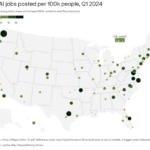Jaywalking. That was what former Tonight Show host Jay Leno called his interviews with people on the streets, asking about history or current events. Most of their answers, you’ll recall, were delightfully wrong. Abraham Lincoln identified as the first President. A furrowed brow when asked the country where the Panama Canal is located.

Policymakers considering how to engage on “artificial intelligence” would do well to keep this in mind. The lesson: Avoid the term altogether. For most people, it inspires a vague sense of dread that is not helpful for policymaking or healthy public discourse. Even in more sophisticated circles, the term doesn’t carry much water. The conventional definition going back to the early use of the term at Dartmouth in the 1950s – the performance of human-like cognitive functions by machines – circumscribes an immense ocean of meaning. Today, artificial intelligence is commonly used to refer to the smorgasborg of technologies that collect data, identify patterns, and draw actionable conclusions. It’s more specific than “technology” or “computer stuff”, but only by a hair.
So rather than talking about AI, talk about a product or capability that has been deployed in the world. There’s plenty there. Talk about natural language processing and speech recognition. Talk about computer vision and facial recognition. Talk about machine learning and neural networks. Talk about actual products and tools, and how they can be leveraged to solve public policy problems, or what new challenges they might create.
But don’t talk about AI. Unless you’re Jay Leno.
– Brian Brennan, Senior Vice President, Investor Relations and State and Federal Coalitions, Silicon Valley Leadership Group | June 25, 2019





